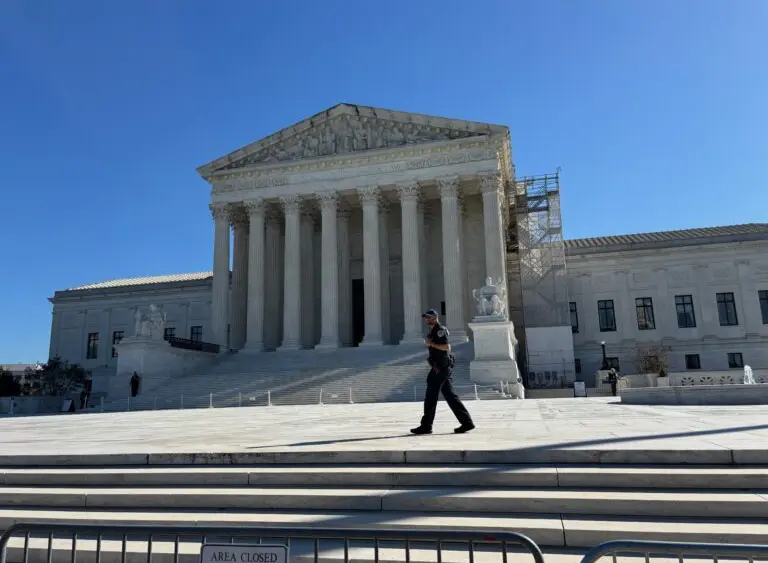WASHINGTON, D.C. – The U.S. Food and Drug Administration is facing increasing pressure from abortion opponents and advocates over how it regulates a drug that has become central to abortion access since Roe v. Wade was overturned three years ago.
Abortion medication manufacturers, health care providers and state attorneys general have continued to petition and sue the agency to loosen regulations for mifepristone, a key abortion drug. At the same time, anti-abortion policy leaders have successfully lobbied the Trump administration — on the basis of a self-published white paper funded by anti-abortion groups — to review mifepristone’s safety again and consider reviving old restrictions.
On Thursday, Nov. 13, the American Civil Liberties Union sued the FDA under a federal public records law for refusing to disclose the parameters of its new review, as well as communications with outside groups.
Abortion opponents have called on the FDA to ban telehealth abortion, which has allowed abortion rates to rise slightly nationally despite state bans. A shift in mifepristone regulation could dramatically change abortion access throughout the country, and health advocates and litigators on both sides of this dispute are closely watching how the agency justifies any changes.
Abortion-rights advocates have also seized on a recent federal ruling from a Trump-appointed judge, which orders the FDA to justify its 2023 decision to maintain restrictions on the abortion pill and argues the agency excluded from its review, without explanation, a wealth of research and evidence that it previously accepted.
Reproductive health legal experts say the action could prevent the anti-abortion white paper from being the main thing the agency considers before modifying its policy.
“This is where the debate, both in the courts and the FDA, is taking place, around how it is considering evidence, making sure it is reviewing valid evidence and not junk evidence, and getting really reasoned explanations based in that evidence, as opposed to politics or ideology,” said Diana Kasdan, the legal and policy director for the Center on Reproductive Health, Law, and Policy at the University of California, Los Angeles School of Law.
Where reproductive health legal experts say the abortion pill has been over-regulated for a drug with a high safety record, anti-abortion attorneys, like senior counsel Erik Baptist of the Christian-right powerhouse Alliance Defending Freedom, have been arguing that the drug’s risks are exacerbated by its increased availability. The law firm, which was integral to the overturning of Roe v. Wade, is also representing a Louisiana woman in an abortion medication lawsuit against the FDA.
“The FDA’s actions have created an even more unsafe environment for women,” Baptist said.
“We expect the Trump administration to zealously appeal this dangerous decision.”
‘It’s the same data set, essentially’
Putting pressure on FDA’s review team are national anti-abortion policy groups like Americans United for Life, one of several groups that criticized the agency for approving a new generic version of mifepristone this fall. The group is part of a coalition that helped produce and, at the end of April, publicize the white paper on mifepristone’s safety, which U.S. Health and Human Services Secretary Robert F. Kennedy Jr. soon after cited as the basis for ordering a new review of the drug.
The Ethics and Public Policy Center’s self-published paper analyzed a commercially available data set of all-payer health insurance claims from 2017 through 2023 and found an 11% rate of severe adverse events — 22 times higher than the less than 0.5% rate that’s on the label for mifepristone. Reproductive health researchers have criticized the paper’s broad classification of serious adverse events while noting it also reports low rates of the most serious side effects associated with medication abortion, like sepsis (0.1%), transfusion (0.15%), and hospitalization related to the abortion (0.66%). Meanwhile more than 100 peer-reviewed studies have found low rates of serious adverse effects, including for abortion medication provided through telehealth.
The paper, which has also been cited by lawmakers like U.S. Sen. Josh Hawley of Missouri, did not go through a scientific peer review, and the Ethics and Public Policy Center would not disclose the exact data set used. Spokesperson Hunter Estes previously told States Newsroom the group was not legally permitted to provide the data set but that the paper’s description of it should be enough to replicate the study.
Americans United for Life CEO John Mize said he hopes to see the paper peer-reviewed in the near future. But he said the coalition has for now achieved its goal of convincing the FDA to look at the same insurance claims data set analyzed by the Ethics and Public Policy Center and then do its own analysis.
“What we’ve been told is the FDA is doing their own internal analysis of the EPPC data,” Mize said. “It’s to be seen what the FDA does with methodology. That’s the important component, because the data is the data. It’s the same data set, essentially.”
HHS did not respond to questions about its ongoing mifepristone review or the federal judge’s recent order to review all of the safety data, instead directing States Newsroom to an Oct. 2 post on X from Kennedy defending both the FDA’s review of mifepristone and its approval of a second generic version.
“Recent studies already point to serious risks when mifepristone is used without proper medical oversight,” Kennedy posted. “@US_FDA only approved a second generic mifepristone tablet because federal law requires approval when an application proves the generic is identical to the brand-name drug.”
But if the FDA’s review ultimately draws different scientific conclusions than the anti-abortion movement, Mize said his side won’t stop pursuing challenges to the drug.
“If it comes out that it’s not nearly as dangerous as what EPPC is reporting, and the data appears to be quality and not skewed by politics, then personally, I might take a different perspective,” Mize said. “But I am still fairly confident that a drug that induces abortion at home without clinical oversight is probably something that needs a little bit more scrutiny. … We might continue to fine tune methodology and look at pursuing other avenues of peer review.”
Politicized science
Anti-abortion policy and legal advocates have been lobbying for tighter restrictions on mifepristone since the drug was first approved in 2000, and especially since the FDA started dropping restrictions, such as allowing the regimen to be used until 10 weeks’ gestation instead of seven in 2016. After Roe v. Wade was overturned, the FDA under President Joe Biden’s administration permanently dropped the in-person dispensing requirement, allowing people to obtain the abortion pill via telehealth and through the mail.
But the FDA maintained other regulations, as part of the drug’s Risk Evaluation and Mitigation Strategy, such as requiring prescribers, pharmacists and patients to sign forms agreeing to meet certain qualifications and acknowledging the drug’s common side effects, like heavy bleeding and nausea, and potential severe risks, like infection. Abortion providers have argued that some of the rules are unnecessary and burdensome.
Of the more than 20,000 prescription drug products approved by the FDA, less than 100 have REMS, and many of those are injectables with serious side effects like coma and death. In a quarter century, the FDA has reported 36 deaths associated with, but not necessarily caused by, mifepristone.
U.S. District Judge Jill Otake on Oct. 30 ordered the FDA to review all the relevant safety data on mifepristone, ruling that the agency erred years ago when it failed to justify maintaining strict rules on the drug despite a strong safety record after 25 years on the market. One week later, the U.S. Senate Democratic Caucus sent a letter to Kennedy and FDA Commissioner Martin Makary demanding the ongoing mifepristone review be based on science and evidence.
“That court order reinforces that, in conducting this new review, FDA may not cherry-pick junk science serving an anti-abortion agenda, but must instead look at the full body of evidence both confirming mifepristone’s safety and underscoring the harms of the FDA’s onerous restrictions,” reads the letter obtained by NOTUS. The senators ask HHS to respond by Nov. 28, to questions about the evidence being considered and the methodology.
Anti-abortion research groups also produced new studies for their first legal attempt to reinstate restrictions on mifepristone in a lawsuit filed in 2022. The plaintiffs persuaded a Trump-appointed district court judge to order the FDA to change its policy on the basis of studies funded by the anti-abortion movement that were later retracted by the journal’s publisher because of their methodology. The U.S. Supreme Court rejected the case, not on the merits but because plaintiffs did not have proper standing. The high court is expected to consider similar questions again, as at least seven mifepristone-focused lawsuits work their way through the lower courts.
University of Pittsburgh law professor Greer Donley said that to meet the FDA’s policy on approving new drug regulations, the agency will need more than one or two outlier studies as justification.
“To survive arbitrary and capricious review, they have to provide a reasoned decision that’s based on the facts, and if the facts taken as a whole suggest that this is a safe and effective drug, even though there’s one new paper out there that suggests it’s maybe a little less safe than it was before, they’re going to have to justify why that one paper outweighs the 50 papers on the other side that were published in peer-reviewed journals,” Donley said. “I don’t know how they could explain that.”
Donley has studied mifepristone regulation closely and said she watched the science around the medication become increasingly politicized, much more than other drugs. While controversial medicine, like gender-affirming care, involve drugs with multiple purposes, mifepristone was approved for the explicit purpose of ending a pregnancy.
The FDA’s medication abortion regimen involves another drug, misoprostol, which was approved to treat ulcers, and is used off-label for abortions and miscarriages. It has not faced the same scrutiny as mifepristone. Abortion providers have said they would likely pivot to a misoprostol-only regimen if mifepristone were to become much harder to access, which it has even for miscarriages in states that have banned abortion entirely, like Kentucky and Louisiana.
Mifepristone manufacturer Danco Laboratories last year confirmed ongoing efforts to add miscarriage management as an approved use to its drug label. Were that to happen, it could be a game changer for access, Greer said.
“It actually would be a pretty huge deal if they added it,” she said. “Because all of these attacks against mifepristone for abortion, even if they succeed, then mifepristone would theoretically remain on the market for miscarriage care, and then it could be used off-label for abortion.”
Read the latest on legal cases over mifepristone winding their way through the courts.
Tomorrow, a look at efforts to both reinforce and crack shield laws across the country.
This story was originally produced by News From The States, which is part of States Newsroom, a nonprofit news network which includes Washington State Standard, and is supported by grants and a coalition of donors as a 501c(3) public charity.
Washington State Standard is part of States Newsroom, a nonprofit news network supported by grants and a coalition of donors as a 501c(3) public charity. Washington State Standard maintains editorial independence. Contact Editor Bill Lucia for questions: info@washingtonstatestandard.com.





